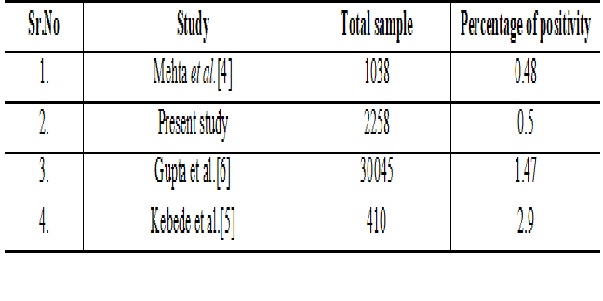Antenatal screening of syphilis: diagnosed by rapid plasma regain and rapid immunochromatography method
Abstract
Background: Syphilis is one of the major causes of adverse outcomes in pregnancy in developing countries. Antenatal screening for syphilis aims primarily at timely detecting & treating pregnant women with congenitally transmissible syphilis, there by preventing perinatal deaths.
Objective: To study prevalence of syphilis in antenatal women by screening them with the Rapid Plasma Reagin (RPR) & rapid immunochromatographic (ICT) method.
Materials and Methods: A total of 2258 pregnant women attending antenatal care from January to December 2018 were tested for Syphilis by RPR & rapid ICT. Results: Out of 2258 women screened during their antenatal visits, 12 (0.53%) were positive by RPR as well as rapid ICT test method. Conclusion(s): Early detection of syphilis in pregnancy is the best tool for prevention of adverse pregnancy outcomes. Antenatal screening of syphilis with Rapid plasma regain (RPR) and Rapid immunochromatography (ICT) is sensitive, specific, rapid and cost-effective method.
Downloads
References
2. Centers of Disease Control & Prevention. Sexually Transmitted Diseases, Treatment Guidelines, Morbidity and Mortality Weekly Report, Recommendations and Reports, 2015, June 5;64(3);34.
3. National Guidelines on Prevention, Management and Control of Reproductive Tract Infections and Sexually Transmitted Infections, Department of AIDS Control Ministry of Health and Family Welfare Government of India 2014, July,106.
4. Mehta KD, Antala S, Mistry M, et al. Seropositivity of hepatitis B, hepatitis C, syphilis, and HIV in antenatal women in India. J Infect Dev Ctries. 2013 Nov 15;7(11):832-7. doi: 10.3855/jidc.2764.[pubmed]
5. Kebede E, Chamiso B. Prevalence of syphilis in pregnancy in Addis Ababa. East Afr Med J. 2000 Apr;77(4):212-6.[pubmed]
6. Gupta N, Gautam V, Sehgal R, et al. Screening by VDRL test to detect hidden cases of syphilis. Indian J Med Microbiol. 2003 Apr-Jun;21(2):118-20.[pubmed]
7. Regional Strategy for elimination of congenital syphilis, WHO, 2009.
8. National Guidelines for The management of Sexually Transmitted Infections Using Syndromic Approach, 2015 July.34-44.[pubmed]
9. Goldenberg RL, Thompson C. The infectious origins of stillbirth. Am J Obstet Gynecol. 2003 Sep;189(3):861-73.[pubmed]
10. Saloojee H, Velaphi S, Goga Y, et al. The prevention and management of congenital syphilis: an overview and recommendations. Bull World Health Organ. 2004 Jun;82(6):424-30.[pubmed]
11. World Health Organization. Treponemal infections. Technical Report Series 674. Geneva: WHO, 1982.



 OAI - Open Archives Initiative
OAI - Open Archives Initiative


